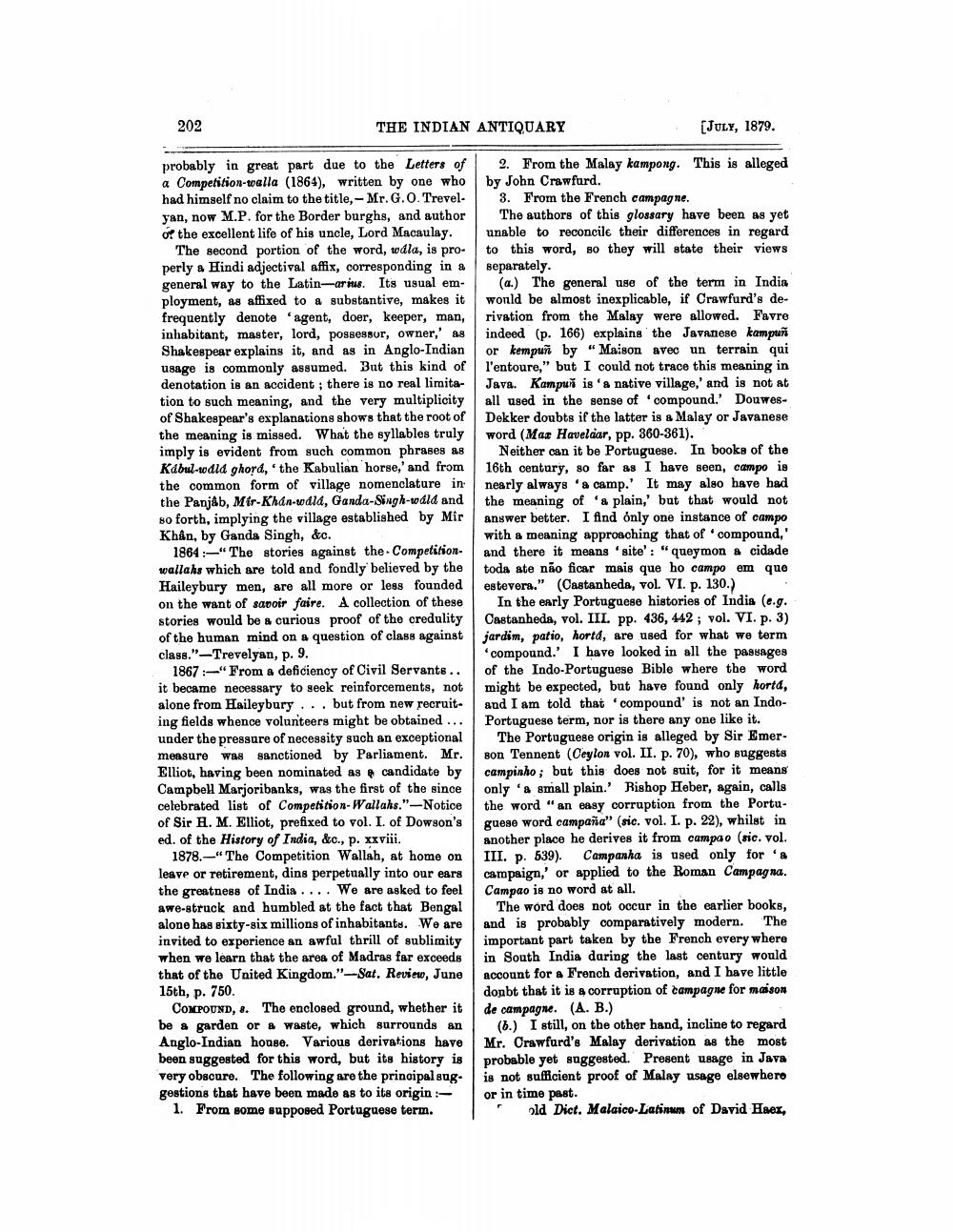________________
202
THE INDIAN ANTIQUARY
[JULY, 1879.
probably in great part due to the Letters of 2. From the Malay kampong. This is alleged a Competition-walla (1864), written by one who | by John Crawfurd. had himself no claim to the title,- Mr.G.O. Trevel. 3. From the French campagne. yan, now M.P. for the Border burghs, and author The authors of this glossary have been as yet or the excellent life of his uncle, Lord Macaulay. unable to reconcile their differences in regard
The second portion of the word, wdla, is pro- to this word, so they will state their views perly a Hindi adjectival affix, corresponding in a separately. general way to the Latin-arius. Its usual em (a.) The general use of the term in India ployment, as affixed to a substantive, makes it would be almost inexplicable, if Crawfurd's de frequently denote agent, doer, keeper, man, rivation from the Malay were allowed. Favre inhabitant, master, lord, possessor, owner,' as indeed (p. 166) explains the Javanese kampuni Shakespear explains it, and as in Anglo-Indian or kempuñ by "Maison avec un terrain qui usage is commonly assumed. But this kind of l'entoure," but I could not trace this meaning in denotation is an accident; there is no real limita- Java. Kampun is a native village,' and is not at tion to such meaning, and the very multiplicity all used in the sense of compound.' Douwesof Shakespear's explanations shows that the root of Dekker doubts if the latter is a Malay or Javanese the meaning is missed. What the syllables truly word (Max Haveldar, pp. 360-361). imply is evident from such common phrases as Neither can it be Portuguese. In books of the Kdbul-wodid ghord, the Kabulian horse,' and from 16th century, so far as I have seen, campo is the common form of village nomenclature in nearly always 'a camp.' It may also have had the Panjab, Mir-Khan-udla, Ganda-Singh-wdld and the meaning of a plain,' but that would not so forth, implying the village established by Mir answer better. I find only one instance of campo Khân, by Ganda Singh, &c.
with a meaning approaching that of compound,' 1864 :-"The stories against the Competition- and there it means 'site': "queymon a cidade wallahs which are told and fondly believed by the toda ate não ficar mais que ho campo em que Haileybury men, are all more or less founded estevera." (Castanheda, vol. VI. p. 130.) . on the want of savoir faire. A collection of these | In the early Portuguese histories of India (e.g. stories would be a curious proof of the credulity Castanheda, vol. IIL. pp. 436, 442 ; vol. VI. p. 3) of the human mind on a question of class against jardim, patio, horta, are used for what we term class."-Trevelyan, p. 9.
*compound.' I have looked in all the passages 1867 :-"From a deficiency of Civil Servants.. of the Indo-Portuguese Bible where the word it became necessary to seek reinforcements, not might be expected, but have found only horta, alone from Haileybury ... but from new recruit- and I am told that 'compound' is not an Indoing fields whence volunteers might be obtained ... Portuguese term, nor is there any one like it. under the pressure of necessity such an exceptional The Portuguese origin is alleged by Sir Emermeasure was sanctioned by Parliament. Mr. son Tennent (Ceylon vol. II. p. 70), who suggests Elliot, having been nominated as candidate by campinho; but this does not suit, for it means Campbell Marjoribanks, was the first of the since only a small plain.' Bishop Heber, again, calls celebrated list of Competition-Wallaks."-Notice the word "an easy corruption from the Portuof Sir H. M. Elliot, prefixed to vol. I. of Dowson's guese word campaña" (sic. vol. I. p. 22), whilst in ed. of the History of India, &c., p. xxviii.
another place he derives it from campao (sic. vol. 1878.—"The Competition Wallah, at home on III. p. 539). Campanha is used only for a leave or retirement, dins perpetually into our ears campaign,' or applied to the Roman Campagna. the greatness of India . . . . We are asked to feel Campao is no word at all. awe-struck and humbled at the fact that Bengal The word does not occur in the earlier books, alone has sixty-six millions of inhabitants. We are and is probably comparatively modern. The invited to experience an awful thrill of sublimity important part taken by the French every where when we learn that the area of Madras far exceeds in South India during the last century would that of the United Kingdom."-Sat. Review, June account for a French derivation, and I have little 15th, p. 750.
donbt that it is a corruption of campagne for maison COMPOUND, S. The enclosed ground, whether it de campagne. (A. B.) be a garden or a waste, which surrounds an (6.) I still on the other hand, incline to regard Anglo-Indian house. Various derivations have | Mr. Crawford's Malay derivation as the most been suggested for this word, but its history is probable yet suggested. Present usage in Java very obscure. The following are the principal sug. is not sufficient proof of Malay usage elsewhero gestions that have been made as to its origin
or in time past. 1. From some supposed Portuguese term.
old Dict. Malaico-Latin of David Haer,




